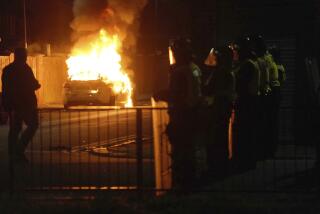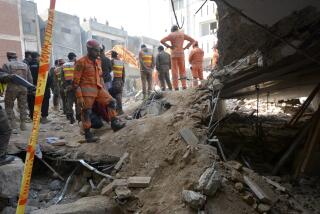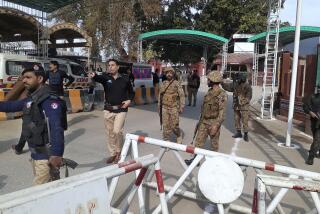Police Follow Foreign Links to London Attacks
- Share via
LONDON — As investigators Sunday explored international links to four British Muslims behind the July 7 suicide bombings of three subway trains and a double-decker bus, officials prepared to introduce tough legislation today that would make it a crime to incite, foster or glorify terrorism.
Six more arrests were reported in the northern city of Leeds, following the detention last week of one man who knew the bombers. But police said the latest arrests had no connection with the London bombings.
“At this stage these arrests are not being linked to the events in London,” West Yorkshire police said in a statement.
Police continued to comb through seven of 10 residences raided in Leeds and Aylesbury during the last week, searching for clues to the methods and motivations behind the blasts that killed at least 55 people, including the four bombers.
But the focus of the investigation moved from the former stomping grounds of the bombers to their reported connections with the Al Qaeda global terrorist network.
At least eight people have been arrested in Pakistani cities visited this year by Shahzad Tanweer, the 22-year-old cricket enthusiast police say blew up a Circle Line train near the Liverpool Street and Aldgate subway stations in a coordinated rush-hour attack with at least three accomplices. Tanweer, reportedly accompanied by Mohamed Sidique Khan, who is said to have bombed an Underground train near Edgware Road Station, visited Islamic schools in Lahore and Faisalabad during a three-month visit to Pakistan that ended in February, British newspapers reported.
Pakistani intelligence officials have told journalists in Islamabad, the capital, that Tanweer met with Osama Nazir, a member of the radical Jaish-e-Muhammad organization, during a 2003 visit to Faisalabad. At least four of those arrested in the wake of the London bombings were rounded up in that city, from which Tanweer’s father emigrated in the 1960s.
Nazir, also from Faisalabad, was arrested in December on suspicion of carrying out a 2002 church bombing in Pakistan in which two Americans died.
British and Pakistani investigators have also begun examining Tanweer’s phone records in their search for links between the bombers and possible instigators of the attack who might be hiding in the mountainous area bordering Afghanistan. Al Qaeda mastermind Osama bin Laden has long been suspected of taking refuge in the warren of caves and subterranean safe houses in the remote region.
Reports that Khan, 30, had come under intelligence scrutiny more than a year ago have given rise to speculation, mostly in the media, that security forces might have missed opportunities to avert the deadliest attack on Britons since the Blitz bombings of World War II.
Khan’s name came to the attention of Britain’s MI5 intelligence agency last year when police thwarted a suspected plot to pack a truck full of explosives and bomb a Soho nightclub, London’s Sunday Times reported. The primary school counselor, who had a wife and a child, was deemed to pose little threat and wasn’t placed under surveillance, the newspaper reported.
The Sunday Times and the Independent on Sunday reported that a Pakistani American jailed in the United States had identified a picture of Khan as someone he had met in Pakistan. Mohammed Junaid Babar, 29, was arrested upon return to the United States from a “terror summit” in the Waziristan tribal region of Pakistan in March 2004. He pleaded guilty to a slate of charges three months later, including involvement in the suspected nightclub bombing plot, and reportedly has been providing information to interrogators on other terrorism cases.
News agencies in Islamabad quoted unidentified intelligence sources as saying that Tanweer and Khan had arrived at Karachi airport together in November and returned to Britain in early February.
Pakistani Information Minister Sheik Rashid Ahmed and Interior Minister Aftab Khan Sherpao said at an Islamabad news conference that there had been no arrests linked to the London bombings, despite reports from relatives of at least eight men detained by police Friday and Saturday.
An Egyptian who recently completed a doctorate in chemistry at Leeds University remained in custody in Cairo for a third day. The Egyptian Interior Ministry said it had no evidence tying Magdy el-Nashar, 33, to the London bombings, but held him for British interrogators who arrived in Cairo on Saturday.
Nashar rented an apartment in Leeds, home to three of the bombers, where police found traces of explosives of the type used in the London attacks, as well as in other, Al Qaeda-linked blasts. Neighbors and friends of the Egyptian who had lived in Leeds for five years before going to Cairo in late June said he frequented the same Grand Mosque where the three local bombers prayed.
Police in Jamaica interviewed the father of 19-year-old Germaine Lindsay, a Muslim convert named by police as the suicide bomber who had attacked the Piccadilly Line subway near King’s Cross Station, killing himself and at least 26 others. Nigel Lindsay, 45, was questioned at the request of Scotland Yard, British High Commission spokesman Mark Waller said in Kingston, the Jamaican capital.
The elder Lindsay told Radio Jamaica he hadn’t seen his son since he was 11 but was in regular phone contact with him in the last year until about two months ago. He knew of his son’s conversion to Islam, but said he hadn’t been concerned about it. Germaine Lindsay was 5 months old when his mother, Miriam, emigrated with him from Jamaica to Britain.
Hundreds of police officers spent the weekend poring over witness reports in response to investigators’ appeals for information about the last 90 minutes in the life of the fourth suicide bomber, 18-year-old Hasib Hussain. The burly teenager, whose remains were found in the No. 30 double-decker bus wreckage near Tavistock Square, detonated his rucksack of explosives almost an hour after the subway blasts. Anti-terrorist chief Peter Clarke called on the public to help police piece together Hussain’s movements after the four were captured on surveillance cameras at King’s Cross Station 20 minutes before the three Underground explosions.
Meanwhile, Prime Minister Tony Blair planned to present his Labor Party government’s proposed legislation to deter the spread of radical Islam in Britain. The anti-terrorism laws would make it a crime to take part in terrorist training in Britain or abroad. The measures also would criminalize extremist preaching as incitement to violence, and anyone exalting suicide bombers could be charged with glorifying terrorism.
Home Secretary Charles Clarke will introduce the drafts to Parliament today, and Blair will meet with opposition party leaders.
More to Read
Sign up for Essential California
The most important California stories and recommendations in your inbox every morning.
You may occasionally receive promotional content from the Los Angeles Times.











